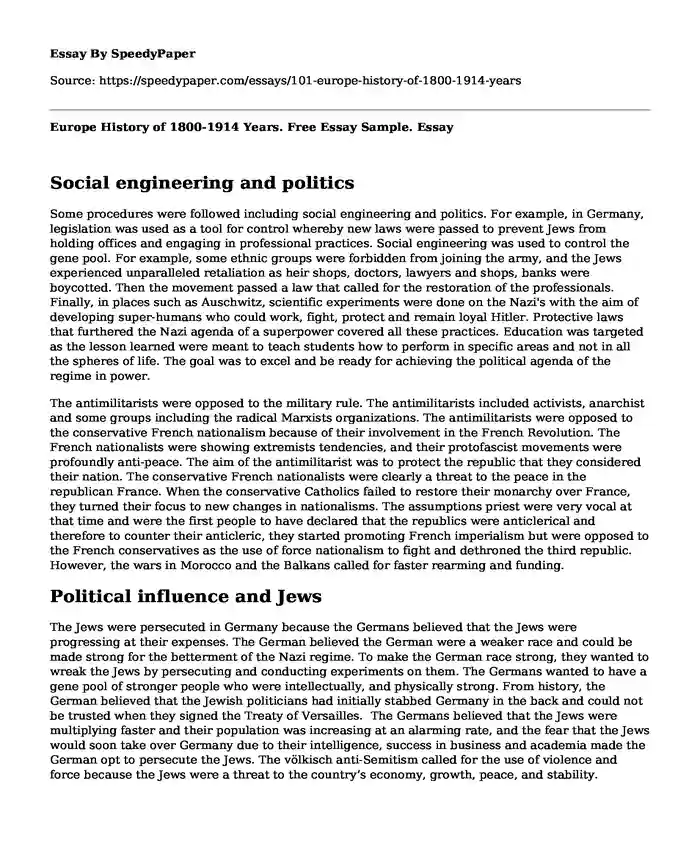Social engineering and politics
Some procedures were followed including social engineering and politics. For example, in Germany, legislation was used as a tool for control whereby new laws were passed to prevent Jews from holding offices and engaging in professional practices. Social engineering was used to control the gene pool. For example, some ethnic groups were forbidden from joining the army, and the Jews experienced unparalleled retaliation as heir shops, doctors, lawyers and shops, banks were boycotted. Then the movement passed a law that called for the restoration of the professionals. Finally, in places such as Auschwitz, scientific experiments were done on the Nazi's with the aim of developing super-humans who could work, fight, protect and remain loyal Hitler. Protective laws that furthered the Nazi agenda of a superpower covered all these practices. Education was targeted as the lesson learned were meant to teach students how to perform in specific areas and not in all the spheres of life. The goal was to excel and be ready for achieving the political agenda of the regime in power.
The antimilitarists were opposed to the military rule. The antimilitarists included activists, anarchist and some groups including the radical Marxists organizations. The antimilitarists were opposed to the conservative French nationalism because of their involvement in the French Revolution. The French nationalists were showing extremists tendencies, and their protofascist movements were profoundly anti-peace. The aim of the antimilitarist was to protect the republic that they considered their nation. The conservative French nationalists were clearly a threat to the peace in the republican France. When the conservative Catholics failed to restore their monarchy over France, they turned their focus to new changes in nationalisms. The assumptions priest were very vocal at that time and were the first people to have declared that the republics were anticlerical and therefore to counter their anticleric, they started promoting French imperialism but were opposed to the French conservatives as the use of force nationalism to fight and dethroned the third republic. However, the wars in Morocco and the Balkans called for faster rearming and funding.
Political influence and Jews
The Jews were persecuted in Germany because the Germans believed that the Jews were progressing at their expenses. The German believed the German were a weaker race and could be made strong for the betterment of the Nazi regime. To make the German race strong, they wanted to wreak the Jews by persecuting and conducting experiments on them. The Germans wanted to have a gene pool of stronger people who were intellectually, and physically strong. From history, the German believed that the Jewish politicians had initially stabbed Germany in the back and could not be trusted when they signed the Treaty of Versailles. The Germans believed that the Jews were multiplying faster and their population was increasing at an alarming rate, and the fear that the Jews would soon take over Germany due to their intelligence, success in business and academia made the German opt to persecute the Jews. The völkisch anti-Semitism called for the use of violence and force because the Jews were a threat to the country’s economy, growth, peace, and stability.
Commercial imperialists advocated for the use of political influence, military forces and diplomacy to extend border and influence in other territories for the commercial gains. The most unusual idea about economic imperialism is that It was mainly economically driven as countries struggle to achieve dominance over other nations. For example, a country like the US uses political influences to create a large market for their products. The country gained from a positive balance of trade as the exports by far exceeded the imports in value. It is also important to note that the surge in imports was only focused on the industries in which the commercial imperialist country had a comparative disadvantage leaving their trading partners with little or no market, as their imports were inferior. The benefit included decreased the cost of trading as driven by economies of large-scale production and transport and significant changes in the trading partners political ideologies as well as some financial assistance alternatives such as grants and aid. In conclusion, commercial imperialist gained significantly during the great depression.
Cite this page
Europe History of 1800-1914 Years. Free Essay Sample.. (2018, Oct 03). Retrieved from https://speedypaper.net/essays/101-europe-history-of-1800-1914-years
Request Removal
If you are the original author of this essay and no longer wish to have it published on the SpeedyPaper website, please click below to request its removal:
- Free Essay on Asian Pacific Americans
- Essay Sample: Should You Get Your Child Vaccinated?
- Free Essay on Global Warming and Climate Change
- The Purpose and Analysis Essay of "The Birthmark" by Nathaniel Hawthorne
- Free Essay: Company Valuation
- Religion Essayy Sample: The Promises of God and the Bible
- A Comprehensive Exploration of Hiring, Admissions, and Educational Gaps - Essay Sample
Popular categories





